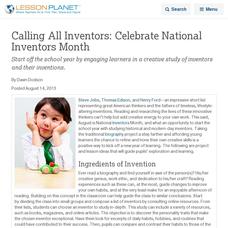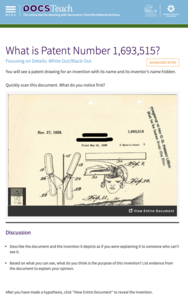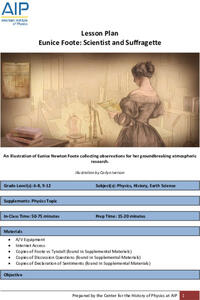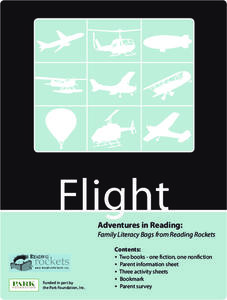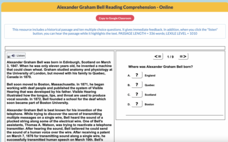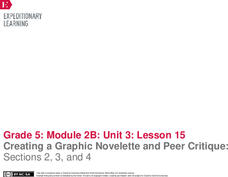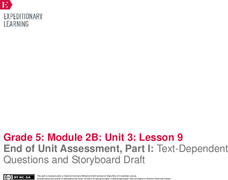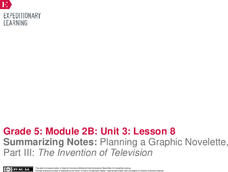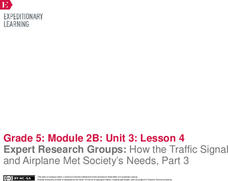Roald Dahl
Roald Dahl Matilda Lesson Plans
Fifty eye-catching pages contain six lessons about Roald Dahl's novel, Matilda. Each lesson has a theme and covers a different subject—literacy, social-emotional learning, science, and geography. Scholars analyze characters, examine...
Smithsonian Institution
The Birth of an Icon: Learning and Performing the Origins of the Drum Set and Early Jazz Drumming in New Orleans, Louisiana
Bass drum, snare drum, tom-toms, cymbals. Perched behind their drum sets, wielding their drum sticks and wire brushes, drummers lay the grove and are the heartbeat of a band's performance. A dynamic lesson introduces young musicians to...
Scholastic
It's a Whatchamacallit
Learners formulate new applications for simple machines in an original invention that solves a common problem. They brainstorm ideas for a new product using simple machines and communicate a finished project through an oral,...
Curated OER
Calling All Inventors: Celebrate National Inventors Month
Start off the school year by engaging learners in a creative study of inventors and their inventions.
Curated OER
Feel Empowered! Teaching About Female Inventors
Inspire children to learn and create by teaching the history of female inventors during National Inventors Month.
Curated OER
Papyrus to PDA
What a great project. Graphic arts students consider the social, political, and economic impact made by a chosen invention. They build an argument to substantiate their reasons for choosing said invention. They create an oral...
Curated OER
Invent It!
Students explore invention and unveiling of world's first Ferris wheel, analyze photographs and poster of first Ferris wheel, and discuss engineering achievements of Ferris wheel, including how it worked, how it was built, and its...
Curated OER
Tools, Technologies and Inventions through the years
5th graders will gain an understanding of how, what, and why people invent tools. This PowerPoint provides a complete description of what tools are, types of tools, why we make tools and what impact they have had on society. There are...
DocsTeach
What is Patent Number 1,693,515?
Scholars examine a document from 1928 featuring a mystery invention. Following their observations and discussion, the document reveals the invention of the permanent wave machine by Marjorie S. Joyner. Class members read about Joyner,...
American Institute of Physics
Eunice Foote: Scientist and Suffragette
The greenhouse effect and climate change are hot topics in today's news. Young scientists may be surprised to learn that the concept is not a new one. In fact, Eunice Newton Foote, scientist, inventor, and suffragette, discovered the...
American Institute of Physics
The Black Scientific Renaissance of the 1970s-90s: African American Scientists at Bell Laboratories
A two-part lesson asks young scientists to research the contributions of African American scientists at Bell Laboratories. After presenting their findings, class members watch two demonstrations that introduce them to total internal...
PBS
Reading Adventure Pack: Flight
A Reading Adventure pack focuses on the invention of flight. After reading a fiction and nonfiction book, scholars take their newfound knowledge to design a one-passenger flying device, experiment with different types of paper airplanes...
Mr. Nussbaum
Alexander Graham Bell
An interactive practice challenges scholars to read an informational text then answer nine questions. The topic of the text is Alexander Graham Bell. Questions are a mix of multiple-choice and fill-in-the-blank.
DocsTeach
Patent Analysis: Wright Brothers' Flying Machine
Ideas take flight in an exciting activity exploring the Wright Brothers. Scholars view the Wright Brothers' patent for their flying machine and makes educated guesses as to the purpose of the document. Scholars discuss the purpose of...
EngageNY
Creating a Graphic Novelette and Peer Critique: Sections 2, 3, and 4
Let's get creative! With the fun resource, pupils continue working on their graphic novelettes about an invention, adding text and images to each section. When finished, they engage in a peer critique process, giving and receiving...
EngageNY
End of Unit Assessment, Part 1: Text-Dependent Questions and Storyboard Draft: “You Can Do a Graphic Novel” Excerpt
Eyes on the finish line. Serving as the first part of the end of unit assessment, learners answer questions based on a text about how to write a graphic novel. Using what they've learned, they then create a storyboard about the invention...
EngageNY
Mid-Unit Assessment: On-Demand Note-taking and Text-Dependent Questions
Flex those brain muscles! Scholars take a mid-unit assessment, conducting research to take notes about how a particular invention helped meet society's needs. To complete the test, they work on draft sketches for their graphic...
EngageNY
Using Quotes and Comparing and Contrasting Structure: The Invention of Basketball
Learners complete the third instructional activity in a row where they determine the gist of text and use quotes as textual evidence. They use details from Dr. James Naismith, Inventor of Basketball to explain how the development of...
EngageNY
Final Performance Task: Presenting Graphic Novelettes
Let's get graphic. Serving as the final performance task of the unit, scholars complete their graphic novelettes and design covers based on their sketches. Finally, they present their hard work to classmates.
EngageNY
End of Unit Assessment, Part III: Storyboard Draft, Section 4
Reflection is the best teacher. Using the resource, scholars complete the final part of their end of unit assessment, the fourth section of their storyboard about an invention. Next, they track their progress using a self-reflection...
EngageNY
End of Unit Assessment, Part II: Storyboard Draft, Sections 2 and 3
It's time to demonstrate knowledge. With the instructive resource, pupils complete the second part of the end of unit assessment. They develop sections two and three of their storyboards about an invention, add visual elements, and then...
EngageNY
Summarizing Notes: Planning a Graphic Novelette, Part III: The Invention of Television
How did the television change people's lives? Learners consider the question as they complete their storyboards about the invention of the TV, adding visual elements along the way. Then, they participate in a peer review to offer and...
EngageNY
Summarizing Notes: Planning a Graphic Novelette, Part II: The Invention of Television
Let's work together! Using the collaborative resource, scholars work in triads to begin section two of their storyboards about Philo Farnsworth, the inventor of the television. They then practice using linking words and phrases to...
EngageNY
Expert Research Groups: How the Traffic Signal and Airplane Met Society’s Needs, Part 3
Pupils work in expert research groups, reading an informational article about an invention and completing a note-catcher worksheet. Afterward, scholars work in triads to answer questions based on the text.





